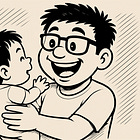Micro-Habits: Taking Gentle Steps Back to Yourself After Loss
How habits can act as anchors to heal from adversity
Before we start
I want to take a moment to share something big…
🎉 I’M WRITING A BOOK! 🎉
It’s called:
Returning: The Gentle Art of Finding Your Way Back
This book is the heart of my philosophy, born from my own struggles and lessons with discipline. It introduces Adaptable Discipline as a sustainable alternative to the rigid, willpower-only models we’re used to.
But for this book to reach the people who need it, I’ll need your help.
I’ve launched a campaign on Publishizer, a crowdfunding platform that connects authors with publishers. The way it works is simple: the more pre-orders we get, the more publishers will see the project, and the stronger the offers become. On the campaign page you’ll find more details, plus a sneak peek at some sample chapters.
👉 My invitation: take a look, consider pre-ordering, or share it with someone who might need this book.
Together, let’s spread the gift of discipline.
P.S. Don’t mind me in the video… I’m still learning how to do that stuff. 😜
By adulthood, most of us have felt the weight of loss: someone we loved deeply, someone we still remember with tenderness. Some losses come early, before we fully understand them. Others arrive later, leaving a heavier mark.
Grief feels different at every stage of life. As children, we may seem resilient because we don’t yet grasp its depth. As adults, we feel it fully, and it often shows up silently, shaping how we move through the world.
Mourning isn’t only about those we’ve lost. It also carries another layer: the loss of a part of ourselves, the version of us tied to what’s now gone. Reflecting over this led me to Karen Sibal’s work, which brings rare clarity and wisdom to a topic that touches all of us.
Have you considered the benefits of the paid companions?
👉 Companions give you the map so you avoid unnecessary drifting
👉 Each guide turns reflection into a practice you can use right away
👉 Weekly practices train the reflex, so returning feels natural when life disrupts
Karen writes beautifully about grief, drawing from her own journey of navigating multiple losses and helping others through theirs. In her publication, The Truth About Grief, she explores the emotional, relational, and practical dimensions of loss, from the aftermath of losing a parent to the slow, sacred process of rebuilding life. Her reflections offer both comfort and practical wisdom, an approach deeply aligned with the values of Adaptable Discipline.
I know this topic may feel heavy, and I understand if it’s not what you need to read today. But if you’re in a place where this could help you, or want to prepare for the inevitable moments of loss, Karen’s piece offers a compassionate way forward.
Let’s dive in.
When life shatters—whether through death, divorce, estrangement, or any profound loss—it’s easy to feel as if you’ve lost not only a loved one, but also your own rhythm.
Grief scrambles your nervous system. Sleep becomes erratic, digestion can feel off, brain fog takes over, and motivation disappears.
In this space, the idea of “self-discipline” can feel impossible—almost cruel.
But healing doesn’t start with giant leaps. We believe it starts with micro-habits: tiny, repeatable actions that rebuild trust with your body and steady your mind, one breath and one day at a time.
Why Micro-Habits Matter in Grief
After a major loss, your stress hormones spike and your brain’s executive function—planning, organizing, decision-making—takes a hit.
Large goals (“I’ll start running three miles a day” or “I’ll completely overhaul my diet”) often backfire, creating more shame when grief’s fatigue makes them unsustainable.
Micro-habits work differently.
They’re small enough to slip past resistance yet powerful enough to re-regulate your nervous system.
Each tiny success tells your body, I’m safe. I can trust myself again.
That trust is the first brick in rebuilding a life that feels livable.
Start With the Body
In yoga and functional medicine, we view the body as both messenger and healer.
When grief floods your system, these three foundational micro-habits create calm and resilience:
Two-Minute Grounding Breath
Sit or stand with feet flat on the floor.
Inhale through the nose for a count of four, exhale through the mouth for a count of six.
Do three cycles when you wake, and three before sleep.
Why it works: A longer exhale activates the parasympathetic nervous system, lowering cortisol and heart rate.
Morning Hydration Ritual
Before coffee, drink a full glass of water with a pinch of mineral salt with a squeeze of lemon.
Why it works: Hydration with natural electrolytes supports adrenal health and stabilizes energy swings common in grief.
Five-Minute Mobility Flow
Cat/Cow, Forward Fold, and Seated Twist—one minute each, repeated.
Why it works: Gentle movement lubricates joints, improves circulation, and signals the body that it’s safe to move through the world.
These may seem small, even trivial.
But practiced daily, they lay the groundwork for mental clarity and emotional regulation, which help with cultivating and keeping good, healthy habits for life.
Layering Habits: The “Stack” Method
Once a single micro-habit feels natural, attach a new one to it—what behavioral science calls “habit stacking.”
Examples:
After your morning breath practice, write one sentence of gratitude or intention in a notebook.
After brushing your teeth at night, set a glass of water on the nightstand for tomorrow’s hydration ritual.
After your five-minute mobility flow, step outside for one minute of sunlight.
By linking habits to something you already do, you remove the need for extra willpower.
Each stack reinforces the message: I can count on myself.
Healing Through Consistency, Not Perfection
Grief healing isn’t a straight line.
Some days you’ll forget.
Some days you won’t want to move.
That’s okay.
In yoga, we talk about abhyasa—steady, gentle effort over time.
It’s not about rigid discipline; it’s about returning, again and again, to small acts of care.
Your body learns safety through repetition, not through self-criticism.
Celebrate micro-successes: three breaths taken with awareness, a single glass of water, one stretch before bed.
These are victories.
They’re simple ones.
They are the seeds of a new nervous system and a steadier heart.
Micro-habits: The Doorway to Self-Discipline
Micro-habits work to heal from adversity because they calm the storm enough for you to feel your own strength again.
From here, the practice of self-discipline—the ability to show up consistently for what matters—can take root.
Let’s explore how self-discipline builds on these small actions, turning them into a resilient framework after life after loss or any adversity:
Remember, healing isn’t about doing everything at once.
It’s about honoring each breath, each choice, each micro-moment of courage—until they add up to a living the life you truly want and deserve.
Many of you know the story of my dog, Kobe, who I lost suddenly in 2021. He was my first dog, my companion through some of the loneliest years of building a life in a new country. When he died, the structure I’d built around him — the walks, routines, and even a sense of purpose — collapsed.
Around that time, while doomscrolling on social media, I came across a video of a man who had lost his father. He was asked about the most important advice he had ever received, and without hesitation he recalled something his therapist, I believe, had once told him:
“Allow yourself to lose yourself. But make sure you find your way back.”
That line stayed with me. It gave me permission to grieve fully while still holding onto the intention of returning.
Grief isn’t limited to death. We grieve jobs, relationships, dreams, and identities that no longer exist. Science explains why this feels so heavy: grief floods the brain with stress hormones, activates the emotional centers, and dims the parts responsible for planning and focus. Although we have been told differently, healing isn’t only about willpower; biology plays a part in it too.
Karen’s reflections align with this.
Micro-habits like breathing, hydration, and gentle movement signal safety to the nervous system and rebuild trust in ourselves. Over time, they become the foundation for real discipline, through consistency and care.
I hope this piece becomes a resource for you, not just now, but when life inevitably brings loss.
If you’d like practical guidance on applying these ideas, I’ll dive deeper into tomorrow’s paid companion, with tools and practices to help through seasons of grief.
If you are going through this right now, please don’t forget to take care of yourself, because you matter too.
Have a wonderful week!
✨ Ideas Worth Exploring
If this piece resonated, here are a few more that go hand-in-hand.
Enjoying this? Support the mission.
I write Self-Disciplined to help more people build real, lasting discipline — without burnout. If my work has helped you, consider supporting it with a coffee or becoming a member.









It's spot on, right Jane?
Karen titled this work, so kudos to her for the work!! 👏👏
It's been an honor to collaborate with you, Camilo on this post. I appreciate the opportunity, and I'm super stoked about your new book - it is going to be a huge hit! 🙌💖